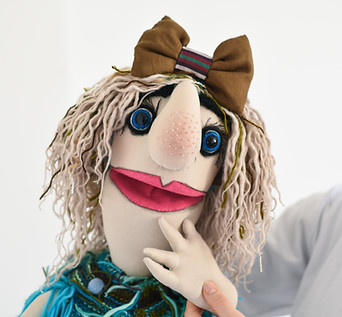
Dramatherapy for Change, Loss, and Grief.
A creative type of psychotherapy
Psychotherapy and counselling refer to a variety of treatments that tend to focus on talking, often called 'Talking Therapies'. This is because they involve talking with a trained therapist. Dramatherapy is a type of psychotherapy that also uses a range of creative interventions, to help you to explore your concerns, thoughts and feelings, and improve your mental health.
Dramatherapists understand that sometimes you might not be able to find the words to express how you feel. Dramatherapists are trained to help you express yourself in ways that might be easier than directly talking about it, and can help you to explore your thoughts and feelings.
Dramatherapists are highly trained psychotherapists and Allied Health Professionals. They must be registered with the Health and Care Professions Council (HCPC). This national regulator holds a register of health and care professionals who meet their Standards of Proficiency and who are bound by their Standards of Conduct, Performance and Ethics. The title 'Dramatherapist' is a protected title by law and only those registered with the HCPC can use it.
Dramatherapists complete post-graduate clinical training at university via a Masters degree. They have a high level of skill in drama and creativity. Many will have studied drama or theatre at a university before undertaking their clinical training. They are clinicians as well as artists.
Do you ever feel you don't have the words to express how you feel?
Sometimes words are just not enough for the big emotions we can experience. But - a piece of music, a character in a film, a photograph, a sound or movement, or a scribble on a piece of paper says everything we are feeling!
When we watch a play or film, read a book, or hear a story we can find that the predicaments or reactions of the fictional characters (who may be very distant from us in time, culture, or lifestyle) provoke a strong emotional reaction in us.
Because emotions in real life can sometimes feel overwhelming, we might block them out or retreat from them. In a fictional reality, like a character in a story, we can allow ourselves to feel these things because we know fiction provides a safe distance. The fiction filters powerful feelings through to us, but they do not engulf us, allowing us to acknowledge them and explore them.
Dramatherapists can use symbols, metaphors, and imagination to create a safe distance for clients to explore and reflect on difficult and painful life experiences and feelings in an indirect and safe way. It provides a way into exploring feelings, concerns, and experiences.
Dramatherapists can use all sorts of things, like stories, characters, masks, puppets, music, play and games, poems, or art making (the kind of things you might normally see in theatre or drama or think of as creative) to help people find ways to safely explore their experiences, tell their stories, and express themselves in a way that might be easier than directly talking about it.


What happens in a dramatherapy session?
During your dramatherapy session, I will listen, and where it is helpful, I will use a range of creative interventions to help you explore your experiences, thoughts and feelings. Using creative strategies, a safe distance can be created for you to explore and reflect on difficult or painful life experiences and feelings in a symbolic and indirect way.
For example, we may use a well-known story or fairytale to talk about you and the people in your life. Maybe talking about Cinderella's life is easier for you than talking about your own memories of your childhood - we can use her story to talk about yours.
We might use metaphors to talk about how you feel. Maybe making up a weather forecast like, "It's really stormy and dark - but I can see the sun poking it's head through the clouds" is easier than saying, "I am finding life really difficult right now - but I have hope things will change".
We might draw, use music, puppets... all sorts of things!
Sometimes there’s lots of talking, sometimes there’s very little. It depends what you need.
You do not need to have any experience of drama or feel you are creative at all to have dramatherapy. The aim is to use creativity to help you explore your experience if it is helpful.
Dramatherapy is an appropriate and helpful type of psychotherapy for people of all ages. I have worked with little ones as young as five and grown-ups in their eighties, and all have found dramatherapy to be helpful! I have provided dramatherapy in all sorts of settings too - including:
-
hospices with children, young people, adults, and older adults
-
psychotherapy services for adults experiencing trauma, mental ill-health, and substance misuse
-
primary schools, secondary schools, and special schools
-
specialist adoption support services and services for children in care
-
and in my private practice.
I specialise in dramatherapy for change, loss, and grief. Please get in touch if you have any questions, or would like to book your session.



